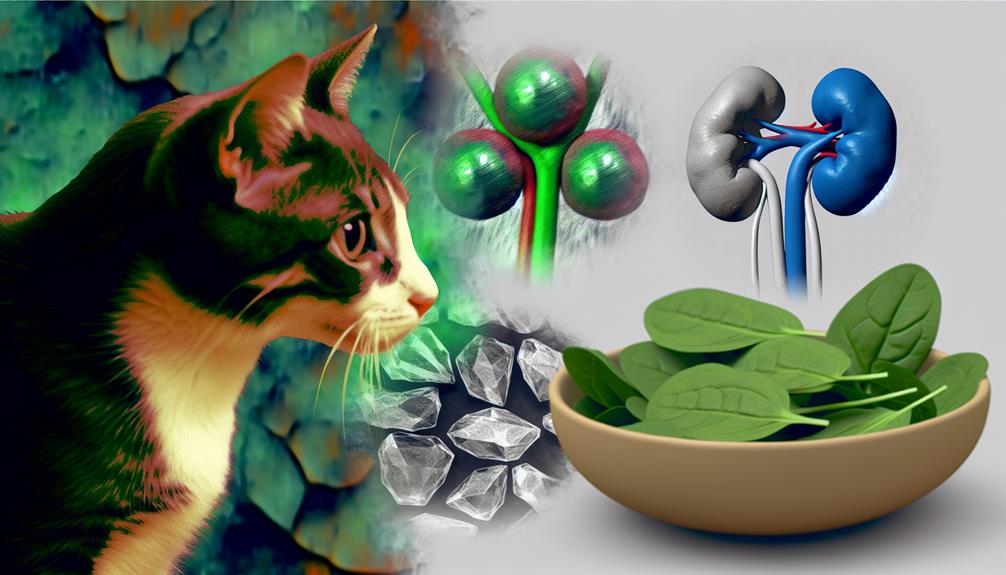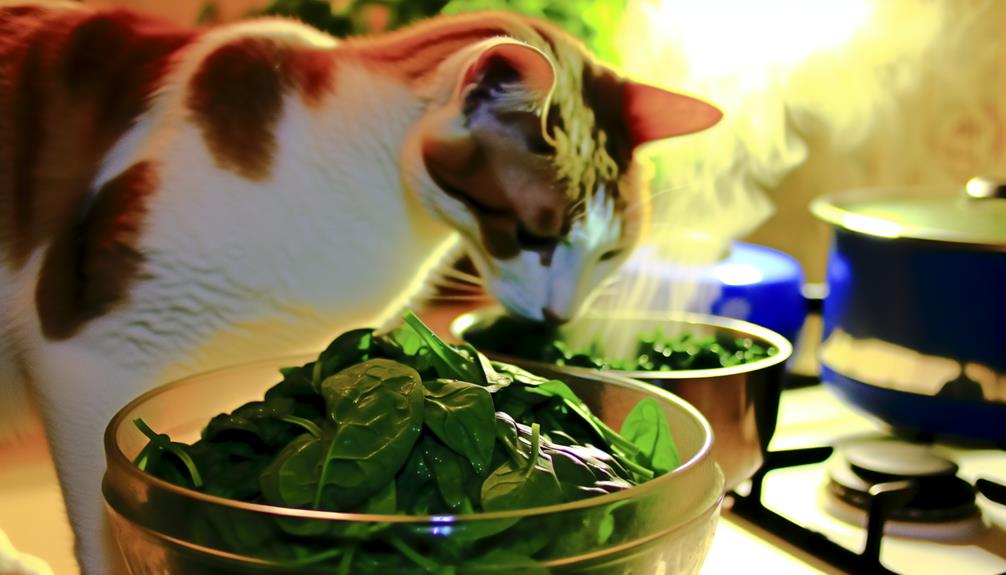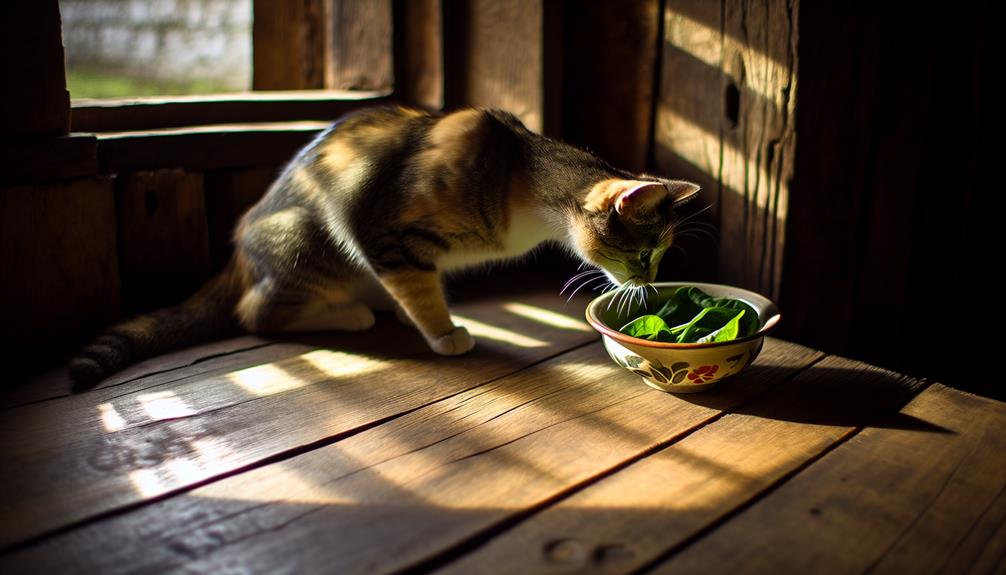Did you know that spinach contains vitamins and antioxidants that can be beneficial for your cat? While it might seem like a healthy treat, there are potential risks involved, particularly due to oxalates that can lead to kidney stones and digestive issues. You might wonder if cooking spinach makes it safer or if it's best to avoid it altogether. Before you decide to share this leafy green with your feline friend, there are several factors to take into account to guarantee their health and safety.
Nutritional Benefits of Spinach
Packed with essential nutrients, spinach offers a variety of health benefits. You'll find that it's a powerhouse of vitamins, minerals, and antioxidants. Spinach varieties, such as Savoy, Flat-leaf, and Semi-Savoy, each provide unique textures and flavors, but their nutritional profiles remain largely consistent.
For felines, incorporating spinach into their diet can introduce several advantages. Spinach is rich in vitamins A, C, and K, as well as folate, magnesium, and iron. These nutrients support overall health, bolster the immune system, and promote healthy skin and coat. Vitamin A is essential for vision and immune function, while vitamin K plays a significant role in blood clotting. Magnesium aids in muscle and nerve function, and iron is critical for oxygen transportation within the bloodstream.
However, it's important to take feline preferences into account when introducing spinach. Cats are obligate carnivores, meaning their primary dietary needs are met through animal proteins. While they may not naturally gravitate towards leafy greens, some cats might show curiosity or even preference for certain spinach varieties due to texture or mild taste.
Incorporating spinach in small amounts can be beneficial, but it shouldn't replace essential components of a feline's diet. The antioxidants found in spinach can help combat oxidative stress, potentially reducing the risk of chronic diseases. Additionally, the fiber content in spinach can aid digestion, though it should be given in moderation to prevent gastrointestinal issues.
Potential Risks for Cats
While spinach can offer some nutritional benefits, it's essential to take into account the potential risks for your cat. Spinach contains oxalates, which can contribute to kidney stone formation, posing a significant health risk. Additionally, some cats may experience digestive issues, such as stomach upset or diarrhea, after consuming spinach.
Oxalates and Kidney Stones
In addition to their nutritional benefits, spinach contains oxalates, which can pose potential risks for cats. Oxalates, naturally occurring compounds found in many plants, can interfere with your cat's kidney function. When ingested in large amounts, oxalates can bind with calcium in the kidneys, leading to the formation of kidney stones. This condition, known as oxalate toxicity, can be particularly harmful to cats, whose urinary systems are more susceptible to blockages and stone formation.
Here's a concise breakdown of the potential risks associated with oxalate consumption in cats:
| Risk Factor | Impact on Cats |
|---|---|
| Oxalate Toxicity | Can lead to kidney stone formation |
| Kidney Function | Impaired by oxalate-calcium binding |
| Urinary Blockages | Increased risk due to stone formation |
| Hydration Levels | Essential for preventing stone formation |
| Dietary Balance | Important to manage oxalate intake |
As a pet owner, it's vital to monitor your cat's diet and guarantee they're not consuming excessive amounts of spinach or other high-oxalate foods. Regular veterinary check-ups can help assess kidney function and detect any early signs of oxalate toxicity. By understanding these risks, you can make informed decisions about your cat's diet and overall health.
Digestive System Impact
Feeding your cat spinach can have notable effects on its digestive system. Cats are obligate carnivores, meaning their digestive systems are primarily designed to process meat. The introduction of plant-based foods like spinach can lead to several issues. Spinach contains high levels of fiber, which cats aren't naturally equipped to digest efficiently. This can disrupt the fermentation process in their gut, potentially leading to gastrointestinal discomfort.
Digestive enzymes in cats are specialized for breaking down animal proteins and fats. When a cat consumes spinach, their digestive enzymes may struggle to break down the plant matter effectively. This inefficiency can result in symptoms such as bloating, gas, and even diarrhea. The fiber in spinach can also pass through their digestive tract largely undigested, further exacerbating these symptoms.
Moreover, the oxalates present in spinach can bind to calcium in the digestive system, potentially leading to complications like the formation of kidney stones. While occasional small amounts might not cause significant harm, routinely feeding your cat spinach can lead to ongoing digestive stress and nutrient absorption issues. Consequently, it's essential to evaluate the risks before incorporating spinach into your cat's diet.
Oxalates and Kidney Health

Have you ever wondered how oxalates in spinach could impact your cat's kidney health? Oxalates are naturally occurring compounds found in many plants, including spinach. While they might not pose a significant threat to humans in moderate amounts, they can be quite concerning for your feline friend. Cats are particularly susceptible to oxalate toxicity, which can adversely affect their kidney function.
Oxalates can bind with calcium in the kidneys and form calcium oxalate crystals. These crystals can lead to:
- Kidney stones: Formation of painful and potentially dangerous stones.
- Impaired kidney function: Reduced ability of the kidneys to filter waste.
- Urinary obstruction: Blockages in the urinary tract, leading to difficulty urinating.
- Kidney damage: Long-term damage to kidney tissues, potentially leading to chronic kidney disease.
- Increased toxicity risk: Higher levels of oxalates leading to systemic toxicity.
It's essential to understand that a cat's kidneys are not as efficient as those of humans when it comes to processing and eliminating oxalates. This inefficiency increases the risk of oxalate accumulation and subsequent kidney issues. Even small amounts of oxalates can lead to significant health problems over time. Hence, it's important to be cautious about feeding spinach to your cat.
Monitoring your cat for symptoms related to oxalate toxicity, such as lethargy, decreased appetite, or changes in urination, can be essential for early detection and intervention. If you suspect your cat is suffering from oxalate-related kidney issues, consulting a veterinarian immediately is paramount.
Maintaining your cat's kidney health is a priority, and understanding the risks associated with certain foods like spinach can help you make informed decisions about their diet. Always prioritize their health and well-being by being vigilant about potential dietary hazards.
Safe Serving Sizes
Given the potential risks that oxalates in spinach pose to a cat's kidney health, determining safe serving sizes is of utmost importance. Spinach contains oxalates, which can contribute to the formation of kidney stones, so moderation is key. When it comes to spinach preparation, guarantee that the spinach is thoroughly washed to remove any pesticide residue.
For a typical adult cat, a small portion—approximately one to two teaspoons of finely chopped spinach—should suffice. This amount minimizes the risk associated with oxalate intake while still allowing your cat to benefit from the vitamins and minerals that spinach offers.
Serving frequency is another critical factor. Spinach should not be a daily addition to your cat's diet. Instead, consider offering it as an occasional treat, no more than once or twice a week. This guarantees that your cat isn't exposed to high oxalate levels regularly, reducing the potential for kidney issues. Always monitor your cat for any adverse reactions after consuming spinach and consult your veterinarian if you have any concerns.
Cooking Vs. Raw Spinach

When deciding between cooking spinach or serving it raw to your cat, understanding the nutritional implications is vital. Both forms have their merits and drawbacks, and your choice can affect how well your cat absorbs the nutrients in spinach. Let's explore the specifics of spinach preparation and the different cooking methods to make an informed decision.
Raw spinach retains its full complement of vitamins and minerals, but it also contains oxalates, which can bind calcium and other minerals, potentially leading to deficiencies in your cat. Cooking spinach, on the other hand, reduces the oxalate content but can also degrade some of the beneficial nutrients.
Here are some key points to reflect on:
- Nutrient Preservation: Raw spinach is rich in vitamin C, which diminishes when cooked. However, cooking can enhance the bioavailability of certain antioxidants.
- Oxalate Reduction: Cooking methods like boiling can considerably reduce oxalate levels, making spinach safer for your cat.
- Digestibility: Cooked spinach is generally easier for cats to digest than raw spinach.
- Hydration: Cooking spinach adds moisture, which can be beneficial for your cat's hydration.
- Preparation Safety: Verify that cooked spinach is free from additives like salt, garlic, or onions, which are toxic to cats.
Choosing between raw and cooked spinach ultimately depends on your cat's specific health needs. If oxalate content is a concern, lightly steaming or boiling the spinach might be the best option. Conversely, if you're aiming to maximize vitamin intake, raw spinach, in moderation, could be more suitable. Always monitor your cat's response to new foods and consult with your veterinarian for personalized advice.
Signs of Allergic Reaction
If your cat shows signs of an allergic reaction after consuming spinach, look for symptoms like vomiting, diarrhea, and excessive scratching. These symptoms warrant immediate veterinary attention to prevent further complications. Always monitor your cat closely when introducing new foods.
Common Allergy Symptoms
How can you tell if your cat is having an allergic reaction? Recognizing the signs of cat allergies is vital, especially when introducing new foods like spinach. While spinach toxicity is rare, some cats might still develop an allergic reaction. Here are common symptoms to watch for:
- Itching and Scratching: Excessive itching or scratching can indicate an allergic response.
- Sneezing and Coughing: Respiratory issues such as sneezing or coughing may be signs of an allergy.
- Vomiting or Diarrhea: Gastrointestinal distress often accompanies food allergies.
- Swelling: Swelling around the face, paws, or other parts of the body can be a concerning symptom.
- Red or Inflamed Skin: Noticeable changes in skin color or texture might signal an allergic reaction.
These symptoms can vary in intensity and may not always be immediate. If your cat exhibits any of these signs after consuming spinach, it's important to monitor them closely. Cat allergies can manifest swiftly, and understanding these symptoms helps you act promptly. Be vigilant for these signs to guarantee your cat's well-being. While knowing the symptoms is important, always consult your veterinarian for a definitive diagnosis and tailored advice.
Immediate Veterinary Attention
Why is it essential to seek immediate veterinary attention if your cat exhibits signs of an allergic reaction? Cats can develop severe and life-threatening responses to allergens, including foods like spinach. Emergency symptoms to watch for include difficulty breathing, swelling of the face or paws, vomiting, diarrhea, and excessive scratching or grooming. These symptoms indicate your cat's immune system is overreacting, which can escalate quickly and become fatal.
If you observe these signs, it's important to act without delay. Allergic reactions can progress rapidly, and time is of the essence. Contact your veterinarian immediately for professional veterinary advice. They can provide guidance on whether to bring your cat in for emergency care or administer any home treatments in the interim.
Your veterinarian may administer antihistamines, corticosteroids, or even epinephrine, depending on the severity of the reaction. They can also monitor your cat for any complications that may arise and provide supportive care as needed. Remember, prompt action can make a significant difference in your cat's health and well-being. Don't hesitate—if in doubt, always opt for immediate veterinary attention.
Alternatives to Spinach

When considering alternatives to spinach for your feline friend, it is important to focus on options that provide similar nutritional benefits without posing potential health risks. Cats have unique dietary needs, so incorporating cat friendly vegetables as healthy treat options can be beneficial. Here are some suitable alternatives:
- Pumpkin: Rich in fiber, pumpkin aids in digestion and can help alleviate constipation. It is also packed with vitamins A and C.
- Zucchini: Low in calories and high in water content, zucchini offers hydration along with vital nutrients like potassium and manganese.
- Peas: These little legumes are a good source of protein, fiber, and vitamins A, B1, C, and K. They can be served cooked or raw.
- Carrots: High in beta-carotene and fiber, carrots are a crunchy treat that supports eye health and digestion.
- Green Beans: Offering a blend of protein, iron, and vitamins B6, A, and C, green beans are great for overall health and can be easily integrated into your cat's diet.
While these vegetables can serve as excellent supplements, it is important to remember that they should not replace a balanced, meat-based diet. Always introduce new foods gradually and monitor for any adverse reactions. Cooking vegetables lightly can make them easier to digest and can help retain their nutritional value.
It is advisable to consult your veterinarian before making significant changes to your cat's diet. They can provide personalized recommendations based on your cat's specific health requirements. By choosing the right cat friendly vegetables as healthy treat options, you can guarantee your feline companion enjoys a varied and nutritious diet without the risks associated with spinach.
Conclusion
In summary, cats can cautiously consume cooked spinach in small servings. While spinach supplies substantial vitamins and antioxidants, its oxalates pose potential problems for your pet's kidneys. Prioritize proper preparation and portioning to prevent possible perils. Always consult your vet to guarantee a balanced, beneficial diet for your feline friend. Stay vigilant for any adverse reactions, and consider safer alternatives if necessary. Your care and caution can create a healthy, happy life for your cat.
